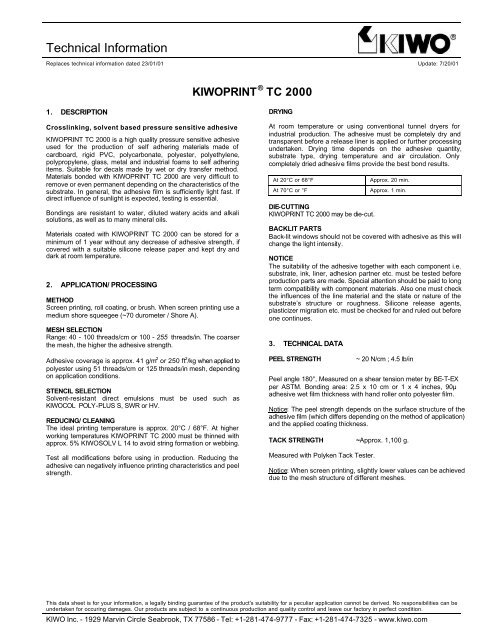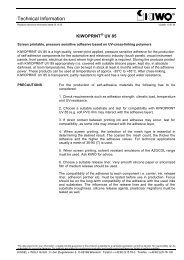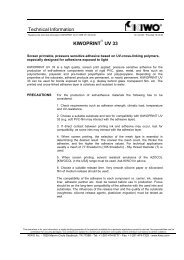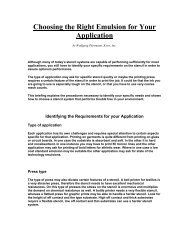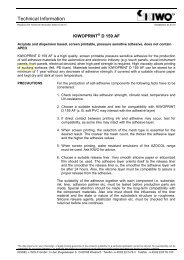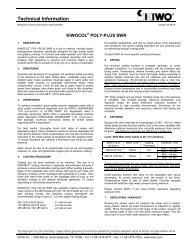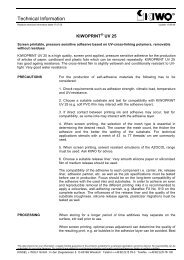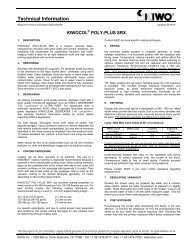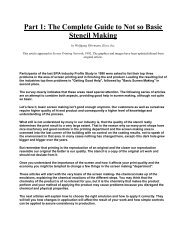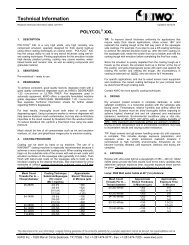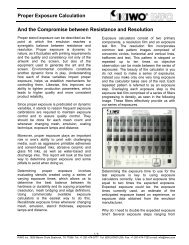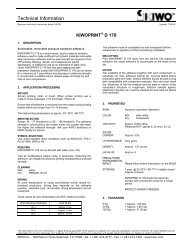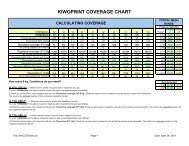You also want an ePaper? Increase the reach of your titles
YUMPU automatically turns print PDFs into web optimized ePapers that Google loves.
<strong>Technical</strong> <strong>Information</strong><br />
Replaces technical information dated 23/01/01 Update: 7/20/01<br />
<strong>KIWO</strong>PRINT ® TC 2000<br />
1. DESCRIPTION<br />
Crosslinking, solvent based pressure sensitive adhesive<br />
<strong>KIWO</strong>PRINT TC 2000 is a high quality pressure sensitive adhesive<br />
used for the production of self adhering materials made of<br />
cardboard, rigid PVC, polycarbonate, polyester, polyethylene,<br />
polypropylene, glass, metal and industrial foams to self adhering<br />
items. Suitable for decals made by wet or dry transfer method.<br />
Materials bonded with <strong>KIWO</strong>PRINT TC 2000 are very difficult to<br />
remove or even permanent depending on the characteristics of the<br />
substrate. In general, the adhesive film is sufficiently light fast. If<br />
direct influence of sunlight is expected, testing is essential.<br />
Bondings are resistant to water, diluted watery acids and alkali<br />
solutions, as well as to many mineral oils.<br />
Materials coated with <strong>KIWO</strong>PRINT TC 2000 can be stored for a<br />
minimum of 1 year without any decrease of adhesive strength, if<br />
covered with a suitable silicone release paper and kept dry and<br />
dark at room temperature.<br />
2. APPLICATION/ PROCESSING<br />
METHOD<br />
Screen printing, roll coating, or brush. When screen printing use a<br />
medium shore squeegee (~70 durometer / Shore A).<br />
MESH SELECTION<br />
Range: 40 - 100 threads/cm or 100 - 255 threads/in. The coarser<br />
the mesh, the higher the adhesive strength.<br />
Adhesive coverage is approx. 41 g/m 2 or 250 ft 2 /kg when applied to<br />
polyester using 51 threads/cm or 125 threads/in mesh, depending<br />
on application conditions.<br />
STENCIL SELECTION<br />
Solvent-resistant direct emulsions must be used such as<br />
<strong>KIWO</strong>COL POLY-PLUS S, SWR or HV.<br />
REDUCING/ CLEANING<br />
The ideal printing temperature is approx. 20°C / 68°F. At higher<br />
working temperatures <strong>KIWO</strong>PRINT TC 2000 must be thinned with<br />
approx. 5% <strong>KIWO</strong>SOLV L 14 to avoid string formation or webbing.<br />
Test all modifications before using in production. Reducing the<br />
adhesive can negatively influence printing characteristics and peel<br />
strength.<br />
DRYING<br />
At room temperature or using conventional tunnel dryers for<br />
industrial production. The adhesive must be completely dry and<br />
transparent before a release liner is applied or further processing<br />
undertaken. Drying time depends on the adhesive quantity,<br />
substrate type, drying temperature and air circulation. Only<br />
completely dried adhesive films provide the best bond results.<br />
At 20°C or 68°F<br />
At 70°C or °F<br />
DIE-CUTTING<br />
<strong>KIWO</strong>PRINT TC 2000 may be die-cut.<br />
Approx. 20 min.<br />
Approx. 1 min.<br />
BACKLIT PARTS<br />
Back-lit windows should not be covered with adhesive as this will<br />
change the light intensity.<br />
NOTICE<br />
The suitability of the adhesive together with each component i.e.<br />
substrate, ink, liner, adhesion partner etc. must be tested before<br />
production parts are made. Special attention should be paid to long<br />
term compatibility with component materials. Also one must check<br />
the influences of the line material and the state or nature of the<br />
substrate’s structure or roughness. Silicone release agents,<br />
plasticizer migration etc. must be checked for and ruled out before<br />
one continues.<br />
3. TECHNICAL DATA<br />
PEEL STRENGTH<br />
~ 20 N/cm ; 4.5 lb/in<br />
Peel angle 180°, Measured on a shear tension meter by BE-T-EX<br />
per ASTM. Bonding area: 2.5 x 10 cm or 1 x 4 inches, 90µ<br />
adhesive wet film thickness with hand roller onto polyester film.<br />
Notice: The peel strength depends on the surface structure of the<br />
adhesive film (which differs depending on the method of application)<br />
and the applied coating thickness.<br />
TACK STRENGTH ~Approx. 1,100 g.<br />
Measured with Polyken Tack Tester.<br />
Notice: When screen printing, slightly lower values can be achieved<br />
due to the mesh structure of different meshes.<br />
This data sheet is for your information, a legally binding guarantee of the product's suitability for a peculiar application cannot be derived. No responsibilities can be<br />
undertaken for occuring damages. Our products are subject to a continuous production and quality control and leave our factory in perfect condition.<br />
<strong>KIWO</strong> Inc. - 1929 Marvin Circle Seabrook, TX 77586 - Tel: +1-281-474-9777 - Fax: +1-281-474-7325 - www.kiwo.com
<strong>Technical</strong> <strong>Information</strong><br />
<strong>KIWO</strong>PRINT ® TC 2000<br />
Page 2 of 2<br />
Update: 7/20/01<br />
4. PROPERTIES<br />
6. ADHESION:<br />
BASE:<br />
Synthetic Rubber in solvent solution<br />
Adhesion can be improved by:<br />
COLOR:<br />
TEMPERATURE<br />
RESISTANCE:<br />
slightly yellow, dries transparent<br />
-20°C to +60°C<br />
-4°F to +140°F<br />
Tested with 10 x 2.5 cm or 4 x 1 in adhesive area, 90µ wet<br />
adhesive thickness, polyester bonded to stainless steel, 30g load.<br />
VISCOSITY:<br />
SOLIDS<br />
CONTENT: Approx. 49%<br />
DENSITY:<br />
VOC:<br />
Approx. 2,500 mPas<br />
(RM 180, DIN 53019, MS = 33, D = 100 s -1 )<br />
Approx. 0.92 g/ccm<br />
467 g/l<br />
3.89 lbs/Gal<br />
FLASH POINT: 25°C or 77°F<br />
PRECAUTIONS/<br />
ENVIRONMENTAL<br />
IMPACT:<br />
STORAGE:<br />
Please see the MSDS<br />
9 mo. @ 20-25°C / 68-77°F in properly closed<br />
original container<br />
A. Using parts free of mold release agents or substances such<br />
as fats, oil, wax dust impregnations, etc. (Make sure all parts<br />
that come in contact with the adhesive are dry.)<br />
B. Optimum application temperature : 20-60°C.or 68-140°F<br />
C. Additional pressure (approx.: 3-4 bar) with a heated silicone<br />
rubber pad 40-50°C.or 104-122°F<br />
D. Preventing air bubbles and stretching the substrate during<br />
application.<br />
E. Flat and smooth substrate (i.e. pressure molding parts without<br />
burrs or sprue marks.)<br />
F. Sufficient adhesion surface area relative to total surface area.<br />
7. Additional information<br />
For additional product information, please visit our web site at<br />
www.kiwo.com. All products mentioned in this technical data sheet<br />
are available through <strong>KIWO</strong> Inc. and its distributor network. For<br />
further information contact your <strong>KIWO</strong> distributor or <strong>KIWO</strong> direct.<br />
Thank you for choosing <strong>KIWO</strong>.<br />
5. PACKAGING<br />
4.5 kg = Approx. 1.278 Gal<br />
180 kg = Approx. 51.12 Gal


